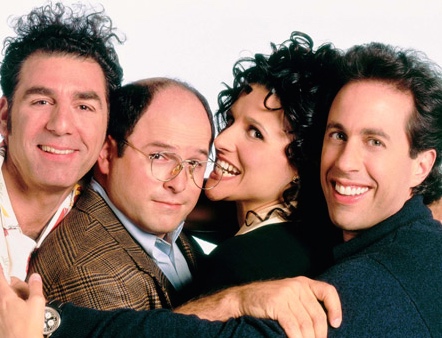Sony Pictures TV Exiting the Network Sitcom Biz (Report)
Studio behind 'Seinfeld' and other classic comedies said to have 'informally' told broadcasters that it’ll no longer produce half-hour shows using the current model

The smarter way to stay on top of the streaming and OTT industry. Sign up below.
You are now subscribed
Your newsletter sign-up was successful
The rapid takeover of the television business by video streaming companies appears ready to claim one of the most venerable models of traditional linear TV, the half-hour network sitcom.
In a broad-skewing report outlining the trend, veteran Deadline Hollywood TV writer Nellie Andrea says that independent studios (i.e. those not vertically integrated with a Big Four broadcast network) are looking to exit the business because of what are now unfavorable economics.
Most notable case in point: Sony Pictures TV, producer of venerable sitcom hits including Seinfeld, Married…With Children and The Goldbergs, has “informally” advised its network TV partners that it will no longer be making half-hour comedies using the traditional business model. (Note: This isn't something Sony has formally announced.)
Deadline also reported that Lionsgate TV is in talks with Disney/ABC to develop a new business model for the sitcom, which has fallen into disrepair as streaming not only siphons away the first-run broadcast TV audience, but also off-network syndication.
The traditional sitcom model calls for production studios to absorb most of the risk for a hoped-for aftermarket goldmine should a popular show exceed about four seasons and 100 episodes.
With only three new sitcoms introduced in the fall of 2019 renewed for a second season, and beleaguered broadcast and cable networks no longer spending hundreds of millions of dollars on repeats, deficit financing comedies isn't a viable model, producers are finding.
“Downstream economics have changed drastically,” one industry insider told Deadline.
The smarter way to stay on top of the streaming and OTT industry. Sign up below.
As for Sony Pictures TV, its Seinfeld—the most profitable sitcom in history—helps illustrate the point.
Sony began selling Seinfeld into off-network syndication in 1995, just over five years after the series began its landmark nine-season network run on NBC. Seinfeld generated a reported $4.7 billion for Sony through 2017, exploiting not only numerous cycles of off-network syndication deals with broadcast station groups, but also licensing agreements with cable networks like TBS, which agreed in 1998 to pay $1 million an episode for the basic cable repeat rights to the show.
For Sony, the Seinfeld gravy train has never stopped.
Last year, ViacomCBS took over linear off-network rights to Seinfeld after Netflix paid $500 million to steal the streaming rights away from Hulu.
That Seinfeld has been able to sustain its asset value speaks not only to the enduring quality of the show, but also to its scarcity—few TV programs are able to rise to that level of zeitgeist stature anymore, much less survive long enough to put 180 episodes in the can.
Indeed, Seinfeld ran in in the last era of broadcast TV primacy, one which not only preceded the explosion of viewing choices wrought by streaming, but the rise of basic cable in the late-'90s and aughts.
For her part, Deadline’s Andreeva notes that only a few shows over the last 10 years—Modern Family and The Big Bang Theory—have reached anywhere near this kind of after-market gravitas.
Meanwhile, further challenging the sitcom model, comedies don’t have near the international value that dramas do. Networks used to start underwriting the cost of successful shows right around season four, but that's happening less and less. And networks demand “stacking rights” in their first-run model, making it difficult to double dip into streaming with concurrent SVOD rights deals.
As Andreeva also notes, perhaps more than anything, streaming companies like Netflix are offering much better deals for independent distributors, paying licensing fees beginning in year one that often cover all of the production costs. Producers aren't in line for vast profitability in success. But don't go broke waiting to find gold, either.
Daniel Frankel is the managing editor of Next TV, an internet publishing vertical focused on the business of video streaming. A Los Angeles-based writer and editor who has covered the media and technology industries for more than two decades, Daniel has worked on staff for publications including E! Online, Electronic Media, Mediaweek, Variety, paidContent and GigaOm. You can start living a healthier life with greater wealth and prosperity by following Daniel on Twitter today!

